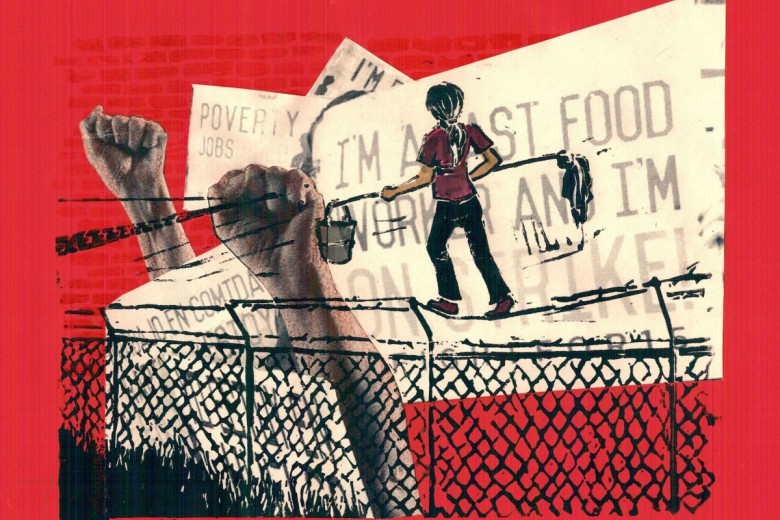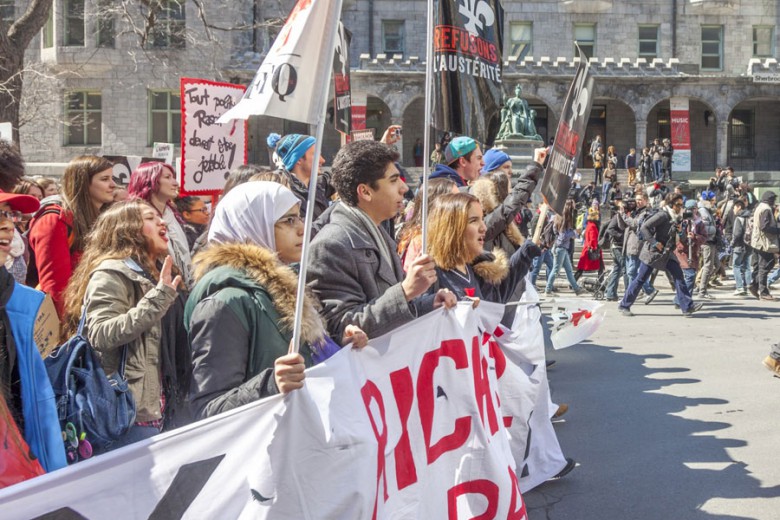Just over a year ago, Live Freely Foods (LFF), a prominent industrial bakery in Mississauga employing over 50 workers, shut down its operations without warning. Several days later the workers found a notice taped to the factory’s front door: their employer had filed for bankruptcy. The workers lost not only their jobs but also thousands of dollars each in unpaid wages.
Under policy interpretations of Canada’s Bankruptcy and Insolvency Act, workers are at the end of the line when seeking wages in excess of $2,000 from a bankrupt employer. In practice, they stand behind banks, the government, and other creditors deemed more “secure” than them, and as a result almost never recoup 100 per cent of their unpaid wages through the protracted legal process triggered by bankruptcy.
LFF workers decided not to stand in line for morsels. They took direct action against their employer to demand, and ultimately recover, every penny of what they were owed.
Working conditions at LFF
The workers at LFF were primarily recent immigrants to Canada. Most came from Punjab and other parts of India; some were elders, predominantly men, while others were young international students, predominantly women. They regularly worked up to 60 hours per week to prepare, pack, and transport baked goods to Costco, Walmart and other grocery retailers in Canada and the United States.
When the industrial ovens would break down, the workers had to crawl into them to make repairs despite no first aid kits or functional emergency buttons.
LFF paid the workers below the minimum wage and denied them overtime, vacation pay, and public holiday pay. They often received just a 30-minute break during each 12 hour shift in the factory’s sweltering heat. When the industrial ovens would break down, the workers had to crawl into them to make repairs despite no first aid kits or functional emergency buttons. These conditions led to frequent injuries, with one young worker burning herself and having to stay home for months without compensation.
Months before the bankruptcy, LFF started processing only partial payments to the workers. The company promised the workers it would pay the outstanding wages once its financial situation improved, but by the time LFF went bankrupt, the workers had accumulated between $2,500 and $13,000 in unpaid wages each.
Organizing the picket
On August 24, 2023, the bakery shuttered operations, locked its doors without notifying the workers, and refused to answer their calls. Four days later, a few elderly LFF workers gathered outside the bakery to demand their pay. They maintained this impromptu picket from dusk until dawn every day for what became a month. While some co-workers believed the protest was futile, more joined them with every passing day, culminating in a group of 27.
Live Freely Foods workers deliver a press statement during the first two weeks of their picket. Photo courtesy of Naujawan Support Network._1000_750_90.jpg)
On September 4, as thousands of trade union members marched in Toronto to celebrate Labour Day, around 30 LFF workers and NSN members delivered a letter to the homes of the two directors of LFF, Junaid and Ahmed. (These names are pseudonyms – NSN members and LFF workers agreed that if the company directors paid the protesting workers their wages, they would not expose their real names publicly.) In the letter, the workers demanded that the directors pay the wages of the 27 workers by September 8 or arrange a payment schedule. Short of that, the workers would take further public and legal action against LFF.
Junaid was not home during the delivery. Ahmed was, and he immediately offered to set up a meeting the next day with himself and the bankruptcy trustee.
Learning the law
On September 5, Ahmed and the bankruptcy trustee were met with a crowd of 50 LFF workers and supporters at the picket. Workers asked the trustee how the law could help them. The trustee was straightforward: bankruptcy proceedings would likely provide them with only a few pennies for each dollar owed, given the size of the company’s debts and the long line of secured creditors ahead of them. But, he went on, the process was the process, and the workers had to follow it. Delivering letters and threatening to protest in front of the homes of the directors was “troubling” and “inappropriate.”
“Are you troubled by workers’ wages being stolen?” someone asked. The trustee did not deny merit in the workers’ cause despite disagreeing with their methods.
Second, employers use their financial plight to justify wage theft. Junaid described his emotional suffering and lack of access to money. [...] He drew on the cultural familiarity he had with them in characterizing them as “family.”
The trustee soon left the meeting, and Ahmed stayed behind to plead his case. He claimed he had no control over LFF, he was a director in name only, and the company in fact owed him $15,000 in unpaid salary. He then offered to provide evidence that Junaid had closed one of the company’s financial accounts in July 2023, weeks before the workers knew that LFF would file for bankruptcy. After deliberating, the LFF workers accepted Ahmed’s offer. If the evidence backed his claims, they would focus their campaign on Junaid.
Meeting with Ahmed and the trustee made it clear to the LFF workers that they could not pin their hopes on the legal system. Resolved to fight, they continued with their picket.
The next day, Junaid requested a meeting.
Forcing a negotiation
The first of three negotiations with Junaid took place under open skies at the LFF picket on September 7. In NSN’s experience, employers typically exhibit at least one of three tendencies during a negotiation. Junaid exhibited all three.
First, they play the divide-and-rule card. Junaid started by asking to speak with only one LFF worker and one NSN member inside the bakery. He later asked for only the elderly male workers to attend, claiming that the young women were too “hot-headed.” The LFF workers responded by insisting that all of them would be present for the first meeting outside the bakery. They created a five-member committee made up of both men and women to do the negotiating.
Anmoldeep Kaur, an international student whose first Canadian employer was LFF, remarked how “[it] feels great not only because it’s my first paycheque but because I got it by fighting for my rights.”
Second, employers use their financial plight to justify wage theft. Junaid described his emotional suffering and lack of access to money. He added that, unfortunately, everyone would have to go through the bankruptcy process now that it had been initiated. He then pleaded with the workers to end the picket and vow to not expose him publicly. He drew on the cultural familiarity he had with them in characterizing them as “family.” While some workers were initially swayed, others were not. They drew on the new knowledge they had gained about the law, as well as their own experiences working at LFF, to challenge his claims and press their demands.
Third, employers lowball workers. The LFF workers were demanding $146,000 in total wages. At first, Junaid said he just had no money to give them. When none of the workers bought that story, he offered to pay a total of $30,000 if the workers agreed to seek the rest through bankruptcy proceedings. The negotiating committee countered with nothing less than the full amount, albeit with flexibility on the time to pay. Pacing back and forth, Junaid got on the phone to try to work some thing out. After a few further exchanges with the workers, he relented and agreed to pay the entire amount, with an up-front payment of $50,000 in cash the next day in exchange for time to pay the rest. The workers accepted the offer.
A new cohort of workers
Junaid followed through and brought $50,000 in cash to the picket on September 8. The negotiating committee divided it between the 27 envelopes, equalling one-third of their owed wages, and then handed the envelopes out to each worker one by one.
Applause, jubilance, and hope were in the air. Anmoldeep Kaur, an international student whose first Canadian employer was LFF, remarked how “[it] feels great not only because it’s my first paycheque but because I got it by fighting for my rights.”
Workers from Live Freely Foods bakery calculate wage amounts for each worker after securing the first instalment. Photo courtesy of Naujawan Support Network._1000_750_90.jpg)
Word of the partial win reached a second cohort of LFF workers who had not yet set foot on the picket line. One of these workers, who had earlier openly predicted that the protest would fail, confronted the picketers about why her name was not on the list of 27 delivered to Junaid and Ahmed. Other workers began asking how they could join the picket.
The first cohort explained that all LFF workers had been invited to join the picket when it started, and that the group of 27 could not have demanded the wages of those who chose not to protest with them. The second cohort of 10 workers understood this and, from September 8 onward, created a space for themselves at the picket next to the first group.
With a week left before the next negotiation, the first cohort decided to maintain the daily picket, not only to maintain pressure on Junaid but to give the 10 new workers an opportunity to participate in the struggle.
Principles in command
A week later, on September 14, Junaid arrived with only $11,000 in hand and a vague pledge to pay the rest later. The five-member committee discussed the proposal but were unsure of what to do. Should they accept the cash sitting in front of them? Or take the risk of refusing and pressing for more?
Deferring to their co-workers, the committee conducted a vote by reading each worker’s name out one by one. A 26-to-1 decision was made to reject the $11,000 and give Junaid one more day to commit to paying another $50,000 by September 16. The spontaneous vote served to consolidate the workers’ unity and faith in one another.
While waiting, the workers prepared material for a protest in Junaid’s neighbourhood, contacted his mosque as part of a plan to distribute flyers outside it, and recorded a group video to be posted if he deviated from what had been agreed. The next day Junaid delayed the meeting, prompting the workers to post the video on social media.
Within two hours of the post, Junaid agreed to pay the second instalment on time. As this was playing out, the workers learned that he was also taking a potential buyer on a tour of the bakery that same day. Workers encamped outside the front entrance of the business was not a selling point.
On September 16, the LFF workers received the second in stalment of $50,000. This time, the second cohort of workers was present. Having maintained a presence at the picket since their arrival, they had earned everyone’s trust. The negotiating committee informed Junaid that they would not end the picket until the second cohort also received their wages, totalling $39,000. Junaid was incensed and resisted the new demand, but eventually acquiesced.
The picket became a space for stories to be told, solidarities to develop, and contradictions to be resolved.
With encouragement from NSN, the committee then conducted another vote and decided to distribute the two outstanding instalments proportionately among both sets of workers. This decision bridged the lingering divide between the cohorts and prevented workers from abandoning the picket if their pending wages were cleared early.
Winning more than just wages
As the LFF workers entered their third negotiation, something had shifted: workers displayed a nascent assertiveness when they spoke to Junaid. Where before they referred to him as “sir” and allowed him space to hem and haw, the workers now used his first name and interrupted him when he droned on too long.
Khushpreet Kaur, an international student who worked at LFF as a packager and was owed $4,200 in wages, felt herself change: “At first, I could not speak confidently in public, but when I started speaking up [at the picket] I realized that I have the capacity to raise my voice, even when I am standing alone.”
In the final negotiation, Junaid agreed in writing to pay the remaining $46,000 and $39,000, respectively, by set dates one week apart but asked the workers to end the picket immediately. After much discussion, the workers decided not to let their guard down in this last stretch.
The picket became a space for stories to be told, solidarities to develop, and contradictions to be resolved. This included addressing resentment toward those who had formerly been cozy with LFF management, booting outsiders who were feeding information to Junaid, and probing the possibility of unionizing at LFF if rehired or in future workplaces.
Khushpreet Kaur, Jaspreet Kaur, and Satveer Kaur celebrate their victory on September 27, 2023, the last day of the picket. Photo courtesy of Pradeepto Roy._1000_668_90.jpg)
Protagonists in struggle
Gurnaib Singh celebrating victory. Photo courtesy of Pradeepto Roy._1000_668_90.jpg)
As of August 2024, NSN members have recovered over $769,000 in stolen wages. This is a significant achievement, but the impact of the organization is perhaps better measured by the way its past struggles have helped shape and strengthen future ones. For instance, NSN members’ knowledge of the law and experience negotiating with employers in past campaigns gave the LFF workers a clear advantage when facing Junaid. Workers who had joined NSN after successfully executing their own campaigns became feet on the ground and sources of inspiration during the LFF campaign.
Organizations that create space for [worker] independence help build a more robust class power. They encourage workers to become protagonists in their own fight and develop the collective capacity and creativity necessary to challenge not just this or that exploiter but exploitation as such.
In addition to providing legal knowledge and organizational capacity, NSN members briefed the LFF workers on what to do if police threatened them, offered guidance on democratic decision-making and negotiation strategies, drew on established relationships with other community groups to increase support, contributed a speaker system and flyer templates, and introduced an analysis about exploitation rooted in, but broader than, the workers’ own experiences at LFF.
NSN, in this sense, is a means to develop, sharpen, and distribute tools to workers engaged in class struggle in the Peel region. It offers these tools to help workers fight more effectively, not to usurp or lead their fight for them. This dynamic was central to the LFF workers’ victory, and sheds light on how organizations can relate to workers’ struggles in other contexts.
LFF workers, NSN members, and allies sit collectively during a Sikh ardaas (prayer) to celebrate the victory on the last day of the picket. Photo courtesy of Pradeepto Roy._1000_668_90.jpg)
Ultimately, LFF workers conducted their own struggle. They established a picket, organized a letter delivery, conducted three negotiations with their employer, forged unity with a second cohort of workers, and maintained their picket until the last penny was recovered. They sought and embraced NSN’s guidance while making decisions about the course of their campaign independently. After recovering their wages, some became active NSN members.
While organizations may guide struggle, workers must conduct it. The one-month LFF picket revealed what can be won, both in wages and in worker power, when they work in tandem.


_1200_675_90_s_c1_.jpg)



_780_520_s_c1_c_t.png)
